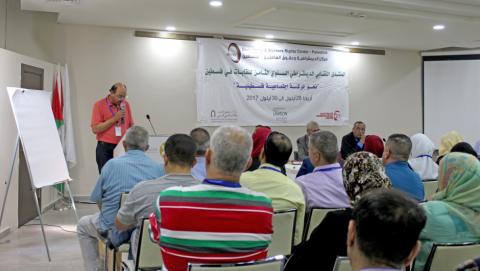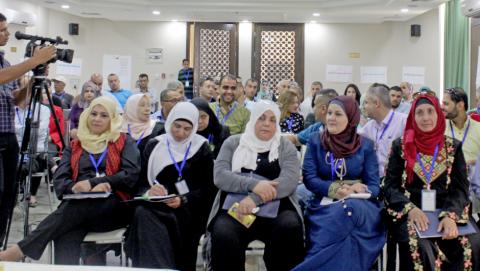
DWRC 8th annual trade union forum focuses on creating a Palestinian Trade Union Social Movement
The Democracy and Workers’ Rights Center in Palestine (DWRC), an ESCR-Net member, concluded its eighth annual forum on trade union solidarity. The gathering of 119 trade union leaders of all genders, representing 52 trade unions and sector federations, sought to develop a common understanding of priority issues and concerns that affect workers’ rights and interests throughout Palestine.
Through facilitated discussions that focused on specific laws and issues that affect workers and reflections on ways to unify the trade union movement, strides were made to get to a greater understanding of what it will take to build a strong social movement that empowers both workers and members of the larger society.
The forum commenced with DWRC General Director and member of ESCR-Net Board Hasan Barghouthi’s survey of the current Palestinian trade union movement situation and call for a unified push to issue laws that will guarantee workers’ rights. Notably, concerns about Palestinian workers in Israeli labor markets were raised, and trade unions committed to democratic processes to elect leadership were highlighted.
Mr. Bilal Thawaba, the general director of the labor relations department at the Palestinian Ministry of Labor, pointed out its role in supporting the workers’ movement. In particular he highlighted how necessary it is to embrace pluralism in order move the trade union movement forward, while also mentioning how trade unions should follow their own constitutional imperatives.
Representing the popular organizations’ department, Mr. Omar Al-Hroub called for more active organizations that legitimize their power through democratic systems, citing the slogan "protect the system to protect the institutions." He also encouraged women and youth to become more involved in such organizations.
Dr. Majed Al-Hilo, the president of the Palestinian Pension Agency, led a discussion on early retirement law, applicable to civilian public sector employees. Mr. Bilal Thawaba also provided an update about the latest developments related to the implementation of the 2016 Social Security Law for private sector workers.
In seven working groups, key issues that merited more discussion were examined in detail, including the law that will regulate the right to strike in public services, mechanisms to unify and democratize the trade union movement, the newly drafted law on trade union organizing and how to build up social movements. Three of those working groups were devoted to focusing on specific topics, namely: the situation and demands of governmental universities and colleges’ employees; the status of municipal worker unions in the Hebron governorate and mechanisms to form a federation; and the main challenges and proposed solutions faced by women in the labor market and in the trade union movement.
For more information, click here.
For a detailed report, click here.

